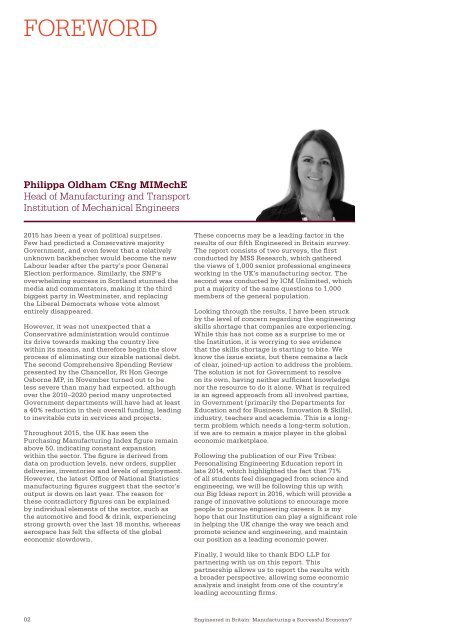ENGINEERED IN BRITAIN MANUFACTURING A SUCCESSFUL ECONOMY?
1Z9yTU8
1Z9yTU8
Create successful ePaper yourself
Turn your PDF publications into a flip-book with our unique Google optimized e-Paper software.
FOREWORD<br />
Philippa Oldham CEng MIMechE<br />
Head of Manufacturing and Transport<br />
Institution of Mechanical Engineers<br />
2015 has been a year of political surprises.<br />
Few had predicted a Conservative majority<br />
Government, and even fewer that a relatively<br />
unknown backbencher would become the new<br />
Labour leader after the party’s poor General<br />
Election performance. Similarly, the SNP’s<br />
overwhelming success in Scotland stunned the<br />
media and commentators, making it the third<br />
biggest party in Westminster, and replacing<br />
the Liberal Democrats whose vote almost<br />
entirely disappeared.<br />
However, it was not unexpected that a<br />
Conservative administration would continue<br />
its drive towards making the country live<br />
within its means, and therefore begin the slow<br />
process of eliminating our sizable national debt.<br />
The second Comprehensive Spending Review<br />
presented by the Chancellor, Rt Hon George<br />
Osborne MP, in November turned out to be<br />
less severe than many had expected, although<br />
over the 2010–2020 period many unprotected<br />
Government departments will have had at least<br />
a 40% reduction in their overall funding, leading<br />
to inevitable cuts in services and projects.<br />
Throughout 2015, the UK has seen the<br />
Purchasing Manufacturing Index figure remain<br />
above 50, indicating constant expansion<br />
within the sector. The figure is derived from<br />
data on production levels, new orders, supplier<br />
deliveries, inventories and levels of employment.<br />
However, the latest Office of National Statistics<br />
manufacturing figures suggest that the sector’s<br />
output is down on last year. The reason for<br />
these contradictory figures can be explained<br />
by individual elements of the sector, such as<br />
the automotive and food & drink, experiencing<br />
strong growth over the last 18 months, whereas<br />
aerospace has felt the effects of the global<br />
economic slowdown.<br />
These concerns may be a leading factor in the<br />
results of our fifth Engineered in Britain survey.<br />
The report consists of two surveys, the first<br />
conducted by MSS Research, which gathered<br />
the views of 1,000 senior professional engineers<br />
working in the UK’s manufacturing sector. The<br />
second was conducted by ICM Unlimited, which<br />
put a majority of the same questions to 1,000<br />
members of the general population.<br />
Looking through the results, I have been struck<br />
by the level of concern regarding the engineering<br />
skills shortage that companies are experiencing.<br />
While this has not come as a surprise to me or<br />
the Institution, it is worrying to see evidence<br />
that the skills shortage is starting to bite. We<br />
know the issue exists, but there remains a lack<br />
of clear, joined-up action to address the problem.<br />
The solution is not for Government to resolve<br />
on its own, having neither sufficient knowledge<br />
nor the resource to do it alone. What is required<br />
is an agreed approach from all involved parties,<br />
in Government (primarily the Departments for<br />
Education and for Business, Innovation & Skills),<br />
industry, teachers and academia. This is a longterm<br />
problem which needs a long-term solution,<br />
if we are to remain a major player in the global<br />
economic marketplace.<br />
Following the publication of our Five Tribes:<br />
Personalising Engineering Education report in<br />
late 2014, which highlighted the fact that 71%<br />
of all students feel disengaged from science and<br />
engineering, we will be following this up with<br />
our Big Ideas report in 2016, which will provide a<br />
range of innovative solutions to encourage more<br />
people to pursue engineering careers. It is my<br />
hope that our Institution can play a significant role<br />
in helping the UK change the way we teach and<br />
promote science and engineering, and maintain<br />
our position as a leading economic power.<br />
Finally, I would like to thank BDO LLP for<br />
partnering with us on this report. This<br />
partnership allows us to report the results with<br />
a broader perspective, allowing some economic<br />
analysis and insight from one of the country’s<br />
leading accounting firms.<br />
02 Engineered in Britain: Manufacturing a Successful Economy?


